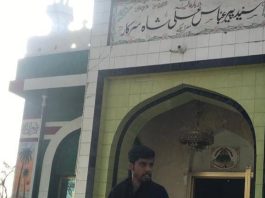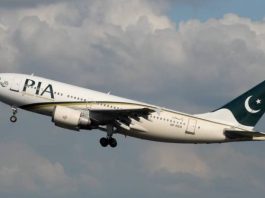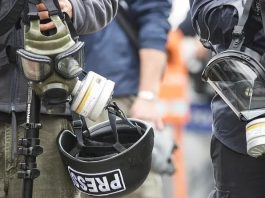Peshawar: If wishes were horses, beggars would ride. And if cars would cost less, many of us would be in motion, owning that pair of wheels and riding it too. Less would be better, but paying as little as Rs 100,000 for a car would be best.
Before you rush to say, “you wish”, consider this: You could actually buy a Honda Civic 2006, for less than that amount. And a Suzuki Mehran 2005 for nearly half of that.
But you would need to have connections, says a regular bidder at government automobile auctions in Khyber Pakhtunkhwa who wishes to remain nameless, preferably in the government circles because cars come for that price only in government auctions.
“Bidders have to have strong connections with committee members to get luxury cars cheap in auctions,” says the bidder. “This practice has been going on for many years.”
The police, the Anti-Narcotics Force, the Excise and Taxation Department, Customs and other departments seize thousands of cars of different makes and models every year. These cars are declared case-property after being impounded in smuggling or other unlawful activity.
“Scores of these vehicles are dumped at warehouses of various law enforcement agencies where they rust and fragment as no one takes care of them,” an official of the Customs Department told News Lens on condition of anonymity. “Others are auctioned and handed over to a favoured few for a meagre amount.”
According to the official, hundreds of impounded vehicles at the government warehouses are auctioned regularly. Documents from one such auction available with News Lens indicate that beneficiaries receiving cheap cars are mostly government officials – especially those working for the very department that has impounded a vehicle – and their relatives and friends.
An official of the Transport Department in Peshawar said no systems or procedures existed at the official level to determine the value of seized vehicles. “This is why most vehicles including luxury cars are sold in auctions for a few thousands rupees.” He and other sources wished to remain anonymous because they feared losing jobs if identified.
Documents from auctions of confiscated vehicles conducted by the provincial government reveal that in 2015, a total of 47 vehicles were auctioned only for Rs 3.7 million. The income tax on these cars amounted to Rs. 376,900.
According to the federal government policy – issued May 15, 1997 – vehicles rendered surplus by the provincial government should be auctioned in a “transparent manner.” Documents show that 80 rounds of auction have been held by the Khyber Pakhtunkhwa government since 1997.
In 32 of these auctions held between 1997 and 2007, the provincial government auctioned 1258 vehicles and 559 motorcycles against Rs 254.425 m. Another 42 rounds took place between July 2010 and March 2015. A total of 1349 vehicles and 309 motorcycles were auctioned for Rs 492.611 m.
Shoaib Jadoon, Director Administration and Excise and Taxation, told News Lens Pakistan that his department’s job was to seize illegal vehicles and hand them over to the Transport Department. “The transport department is responsible for auction of these vehicles and it is up to them to decide how to auction them.”
Since there is no system within any government department except customs to determine the value of seized vehicles, cars are often auctioned for a song. In 2015, a Toyota Corolla 1988 was auctioned for Rs 55,000 while the auction committee members had put the value at only Rs 33,000.
Documents reveal that another Toyota Corolla 2000 was valued at Rs 48,000 but was auctioned for Rs 166, 100 in April 2015. To buy a car of this make and model in the open market in Peshawar would cost a minimum Rs 0.5 million.
A customs official said his department had confiscated a Japanese assembled Toyota Corolla worth at least Rs 0.4 million which was auctioned for Rs 88,000 in the 75th auction, while the auction committee had valued it at Rs 32,000 only.
A section officer at the Transport Department said that they tempered the chassis number of a vehicle before it was put to auction. However, a legal expert in the Customs Department in Peshawar said tempering chassis frame or number was against the law.
“No law or authority grants this power to any seizing agency to tamper with the chassis frame of a vehicle under any circumstances,” he said.
Checking the chassis number of one of the auctioned cars through a bidder who had bought it revealed that the chassis number and frame was not tempered with. However, the car was an NCP – a non-customs paid car or a car on which customs duty was not paid when it entered the country. The condition of the car also didn’t fall under “scrap” – a term used for cars that are irreparable. Far from it, the pictures show a car in good condition.
Habib Afridi, section officer at Transport Department in KP, said the Excise and Taxation Department confiscated these vehicles and auctioned them in the 75th auction in presence of committee members, suggesting that the auctions and the proceedings have the blessings of the committee. “The finance minister KP Muzafar Saeed gave a speech at the 75th auction,” he said.
The committee that supervises auctions includes the provincial finance minister, secretary administration, additional secretary finance, deputy inspector general (DIG) telecommunication, director general Excise and Taxation Department and a section officer of the Transport Department.
Afridi said that the reason the auctioned vehicles were cheap was their poor condition. “These vehicles were in scrap condition and could not be further registered due to the fact that chassis of these vehicles were tampered,” he said.
When asked to provide data and pictures of auctioned vehicles to verify their condition he said: “It is against the Transport Department code of conduct to share such data with journalists.”
However, the auction documents for these vehicles do not mention any damage to the cars. Nor do they say if the chassis of these vehicles were tempered or not.
The Finance Minister KP Muzafar Saeed claimed that scrap vehicles could not be registered with the Excise and Taxation Department. However, the department’s database showed a Suzuki Mehran, model 2005, that auctioned for Rs 55,000 was registered under the number HJ 047. Another Suzuki Mehran, model 2005, was auctioned for Rs 56,100 and was registered under the number LZO 4223. So were a number of other cars that were both shown as scrap and registered with the Excise and Taxation Department.
“These vehicles were unclaimed property,” said Finance Minister Saeed, when asked about scrap vehicles registered with the Excise and Taxation Department. “Our legal responsibility is to auction the confiscated vehicles but we are not responsible if someone is using the auctioned vehicles.”
The minister pointed out that they did not have any mechanism to determine the value of scrap vehicles. “For scrap cars, we don’t have any formula to assess the value. However, we (the committee members) set the price according to the condition of a car. It’s at the discretion of the committee members whatever price they set for a vehicles without any calculation.”
“Under the chairmanship of the auction committee, every auction took place in transparent manner,” said Saeed.
Selling vehicles cheaply by labelling them scrap is not the only problem with auctions conducted under the supervision of the committee. According to rules, only vehicles assembled in Pakistan can be auctioned by the provincial government. But enquiries revealed that vehicles of foreign make are routinely auctioned.
“The provincial government has no power to auction non-custom paid (NCP) vehicles but they are doing it illegally, and with impunity, causing loss of billions of rupees to the national exchequer,” said the official from the Customs Department.
According to an FIR lodged by the Customs Department under Customs Act 1969 in June 2015, the department seized a suspected vehicle that was auctioned by the provincial government. On verification, the vehicle was found to be NCP. The FIR states that the 1994 Corolla was auctioned as a 1992 model. Furthermore, when the lab test of the vehicle was conducted, it revealed that the vehicle did not have a tampered chassis frame. The car was auctioned at Rs 88,000 while the committee had put the value at only Rs 78,000.
A bidder from Peshawar told News Lens Pakistan on condition of anonymity that price fixing was common in government auctions. The practice, he said, was known as ‘ring’. The bidders in a ring secretly agree to share the market between them. They pretend to compete on all major tenders, but agree in advance on who will win each tender.
“A group of bidders have established monopoly in auctions across the province and they are involved in this business of carrying out shady auctions in all the government departments in collusion with government official,” said an official of the Customs Department.



